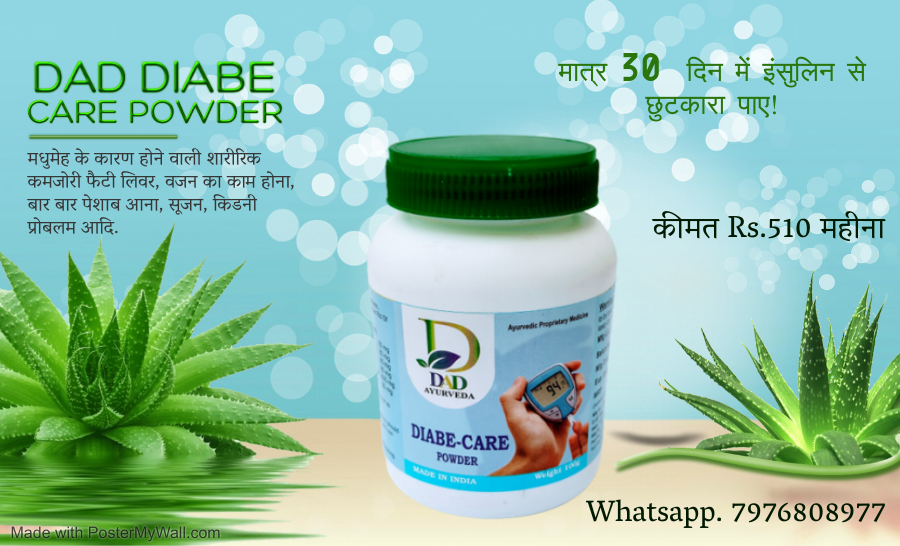Services
DAD Ayurveda Medicine Approach To The Treatment Of Diabetes
DAD Ayurveda Medicine Diagnosing Diabetes
Theoretically, the use of DAD DIABE-CARE with other hypoglycemic drugs could have blood-glucose-lowering effects.
Diabetes is a chronic medical condition characterized by high levels of glucose (blood sugar) in the blood. This condition arises from the body’s inability to produce adequate insulin or effectively use the insulin it produces. Insulin is a hormone produced by the pancreas that helps regulate blood sugar levels by facilitating the uptake of glucose into cells for energy.
The diagnosis of diabetes is primarily based on blood sugar levels. Common tests include:
- Fasting Blood Sugar Test: Measures blood glucose after an overnight fast. A fasting blood sugar level of 126 mg/dL (7.0 mmol/L) or higher indicates diabetes.
- Oral Glucose Tolerance Test (OGTT): Measures blood sugar before and after consuming a glucose-rich drink. A blood sugar level of 200 mg/dL (11.1 mmol/L) or higher two hours after drinking the solution indicates diabetes.
- Hemoglobin A1c Test: Provides an average blood sugar level over the past two to three months. An A1c level of 6.5% or higher indicates diabetes.
At Disha Arogya Dham Ayurveda and Naturopathy Hospital and Research Centre, diabetes is treated using a holistic approach based on Ayurvedic principles. They offer a product called Diabe Care Powder, which is prepared using Ayurvedic formulations and is claimed to manage diabetes with a 100% guarantee. This product is likely to include a blend of herbs and natural ingredients traditionally used in Ayurveda to help regulate blood sugar levels and improve overall health.
Ayurveda emphasizes a balanced lifestyle, diet, and the use of herbal remedies to manage diseases, including diabetes. Common Ayurvedic herbs used for diabetes management include:
It is important to note that while Ayurvedic treatments can complement conventional medical treatments, they should not replace them without consulting healthcare professionals. Managing diabetes typically requires a comprehensive approach, including medication, lifestyle changes, and regular monitoring of blood sugar levels.
At Disha Arogya Dham Ayurveda and Naturopathy Hospital and Research Centre, diabetes is treated using a specific Ayurvedic formulation called Diabe Care Powder, which is prepared by DAD Ayurveda. This treatment approach is based on traditional Ayurvedic principles and aims to manage diabetes by using natural and herbal ingredients.
Diabe Care Powder
Diabe Care Powder is a proprietary Ayurvedic formulation designed to help regulate blood sugar levels in individuals with diabetes. The key aspects of this treatment include:
- Natural Ingredients: The powder is composed of various herbs and natural substances known in Ayurveda for their beneficial effects on blood sugar levels. These ingredients typically include:
- Bitter Melon (Momordica charantia): Helps in reducing blood glucose levels.
- Fenugreek (Trigonella foenum-graecum): Known for its high fiber content, which aids in controlling blood sugar.
- Amla (Emblica officinalis): Rich in vitamin C and has antioxidant properties that help in managing diabetes.
- Gurmar (Gymnema sylvestre): Known to reduce sugar absorption in the intestines and improve insulin function.
- Holistic Approach: The treatment combines the use of Diabe Care Powder with dietary recommendations, lifestyle modifications, and possibly other Ayurvedic therapies such as Panchakarma (detoxification procedures).
- Personalized Treatment: Ayurvedic treatment often involves a personalized approach where the practitioner tailors the therapy based on the individual’s constitution (Prakriti), the nature of the imbalance (Vikriti), and other personal health factors.
Benefits and Claims
The hospital claims a 100% guarantee in managing diabetes with Diabe Care Powder. The benefits of this Ayurvedic treatment include:
- Regulation of blood sugar levels.
- Improvement in overall health and well-being.
- Potential reduction in dependency on conventional diabetes medications.
- Holistic management of diabetes symptoms and prevention of complications.
Consultation and Monitoring
Patients are advised to consult with Ayurvedic practitioners at the hospital to receive a thorough assessment and personalized treatment plan. Regular monitoring of blood sugar levels and follow-up consultations are essential to ensure the effectiveness of the treatment and to make any necessary adjustments.
Important Considerations
- Integration with Conventional Medicine: Patients should inform their primary healthcare providers about their use of Ayurvedic treatments to ensure safe and coordinated care, especially if they are already on diabetes medications.
- Evidence and Research: While many Ayurvedic treatments have been traditionally used for centuries, scientific research on their efficacy can vary. Patients should consider both traditional knowledge and modern scientific evidence when choosing their treatment options.
In summary, Diabe Care Powder from Disha Arogya Dham Ayurveda and Naturopathy Hospital and Research Centre represents an Ayurvedic approach to managing diabetes, emphasizing natural ingredients and a holistic treatment philosophy. As with any medical treatment, it is essential to consult healthcare professionals and consider a comprehensive approach to diabetes management.
In all of these studies patients who took DAD DIABE-CARE orally or in daily doses of 500 to 1000 mg. There was a significant improvement in insulin resistance and glucose effectiveness after 4 weeks of oral treatment or 1 to 10 days after intravenous administration.
DAD DIABE-CARE:
DAD DIABE-CARE is an essential trace mineral whose function is to work with insulin to transport glucose in the body and to help maintain healthy glucose levels. DAD diabetes-care levels may be below normal in patients with diabetes.
In a randomized, controlled study, 160 men and women with type 2 diabetes were divided into three groups and supplemented with 1,000 mg. DAD Diabe-Care Daily (for both doses of DAD Diabe-Care). Subjects continued to take their usual medications and were instructed not to change their normal eating and living habits.
The results were that both doses of supplemental DAD DIABE-CARE had significant beneficial effects on A1C, glucose, insulin, and cholesterol, although the benefits were greater with higher doses. Other studies also suggest that taking DAD DIABE-CARE orally can lower fasting blood sugar, lower A1C levels, lower triglyceride levels, and lower insulin levels in people with type 2 diabetes. Sensitivity may increase.
Some evidence also suggests that DAD Diabi-Care may reduce weight gain and fat accumulation in patients with type 2 diabetes who are taking sulfonylurea (i.e., antidiabetic drugs that work by increasing insulin release from beta cells in the pancreas). Does).
Higher DAD DIABE-CARE doses (1,000 mcg) might be more effective and may work more quickly. Higher doses might also reduce triglyceride and total serum cholesterol levels in some patients.
Additional research demonstrated that DAD DIABE-CARE picolinate also improved glucose levels in patients with type 1 diabetes, as well as gestational and steroid-induced diabetes. Theoretically, its use with other hypoglycemic drugs might cause additive blood sugar-lowering effects.
Taking 1,000 mcg DAD DIABE-CARE with 30 mg live care has been shown to decrease serum levels of live care by 17% compared to taking live care alone, so live care should be taken at least 30 minutes before or 3-4 hours after taking DAD DIABE-CARE. In type 2 diabetics, 600 to 1,000 mcg daily are recommended.

Sumedha:
The smell and taste of Sumedha in Sumedha Brain Boost Tea are probably pleasant to everyone you know. Sumedha is an especially good choice for diabetics, but it turns out that Sumedha may offer some significant health benefits.
While most clinical research suggests that whole Sumadha is effective for type 1 or type 2 diabetes, two studies on a specific water-soluble Sumadha consistently showed beneficial results.
A double-blind study was conducted on 79 patients with type 2 diabetes. Subjects were given 336 mg of Sumedha decoction in water daily for 4 months. Those using Sumedha experienced a significant 10.3% reduction in fasting blood sugar, compared to a non-significant 3.4% reduction.
In another double-blind study, adults with metabolic syndrome (ie, prediabetes) were given a decoction of Sumedha (500 mg per day) orally for 12 weeks. The result was that 83% of those given the extract experienced a significant reduction (about 8%) in fasting blood glucose, in addition,
The Sumedha subjects also experienced significant changes in body composition. His body fat decreased by 0.7%, and his muscle mass increased by 1.1%. These changes occurred without a change in the subjects’ diet or physical activity. Orally, Sumedha appears to be well tolerated. A good dosage of water-soluble Sumadha extract is 500 mg daily.








